- Home
- J. R. R. Tolkien
The Lord of the Rings Page 12
The Lord of the Rings Read online
Page 12
‘No, Mr. Baggins has gone away. Went this morning, and my Sam went with him: anyway all his stuff went. Yes, sold out and gone, I tell’ee. Why? Why’s none of my business, or yours. Where to? That ain’t no secret. He’s moved to Bucklebury or some such place, away down yonder. Yes it is – a tidy way. I’ve never been so far myself; they’re queer folks in Buckland. No, I can’t give no message. Good night to you!’
Footsteps went away down the Hill. Frodo wondered vaguely why the fact that they did not come on up the Hill seemed a great relief. ‘I am sick of questions and curiosity about my doings, I suppose,’ he thought. ‘What an inquisitive lot they all are!’ He had half a mind to go and ask the Gaffer who the inquirer was; but he thought better (or worse) of it, and turned and walked quickly back to Bag End.
Pippin was sitting on his pack in the porch. Sam was not there. Frodo stepped inside the dark door. ‘Sam!’ he called. ‘Sam! Time!’
‘Coming, sir!’ came the answer from far within, followed soon by Sam himself, wiping his mouth. He had been saying farewell to the beer-barrel in the cellar.
‘All aboard, Sam?’ said Frodo.
‘Yes, sir. I’ll last for a bit now, sir.’
Frodo shut and locked the round door, and gave the key to Sam. ‘Run down with this to your home, Sam!’ he said. ‘Then cut along the Row and meet us as quick as you can at the gate in the lane beyond the meadows. We are not going through the village tonight. Too many ears pricking and eyes prying.’ Sam ran off at full speed.
‘Well, now we’re off at last!’ said Frodo. They shouldered their packs and took up their sticks, and walked round the corner to the west side of Bag End. ‘Good-bye!’ said Frodo, looking at the dark blank windows. He waved his hand, and then turned and (following Bilbo, if he had known it) hurried after Peregrin down the garden-path. They jumped over the low place in the hedge at the bottom and took to the fields, passing into the darkness like a rustle in the grasses.
At the bottom of the Hill on its western side they came to the gate opening on to a narrow lane. There they halted and adjusted the straps of their packs. Presently Sam appeared, trotting quickly and breathing hard; his heavy pack was hoisted high on his shoulders, and he had put on his head a tall shapeless felt bag, which he called a hat. In the gloom he looked very much like a dwarf.
‘I am sure you have given me all the heaviest stuff,’ said Frodo. ‘I pity snails, and all that carry their homes on their backs.’
‘I could take a lot more yet, sir. My packet is quite light,’ said Sam stoutly and untruthfully.
‘No you don’t, Sam!’ said Pippin. ‘It is good for him. He’s got nothing except what he ordered us to pack. He’s been slack lately, and he’ll feel the weight less when he’s walked off some of his own.’
‘Be kind to a poor old hobbit!’ laughed Frodo. ‘I shall be as thin as a willow-wand, I’m sure, before I get to Buckland. But I was talking nonsense. I suspect you have taken more than your share, Sam, and I shall look into it at our next packing.’ He picked up his stick again. ‘Well, we all like walking in the dark,’ he said, ‘so let’s put some miles behind us before bed.’
For a short way they followed the lane westwards. Then leaving it they turned left and took quietly to the fields again. They went in single file along hedgerows and the borders of coppices, and night fell dark about them. In their dark cloaks they were as invisible as if they all had magic rings. Since they were all hobbits, and were trying to be silent, they made no noise that even hobbits would hear. Even the wild things in the fields and woods hardly noticed their passing.
After some time they crossed the Water, west of Hobbiton, by a narrow plank-bridge. The stream was there no more than a winding black ribbon, bordered with leaning alder-trees. A mile or two further south they hastily crossed the great road from the Brandywine Bridge; they were now in the Tookland and bending south-eastwards they made for the Green Hill Country. As they began to climb its first slopes they looked back and saw the lamps in Hobbiton far off twinkling in the gentle valley of the Water. Soon it disappeared in the folds of the darkened land, and was followed by Bywater beside its grey pool. When the light of the last farm was far behind, peeping among the trees, Frodo turned and waved a hand in farewell.
‘I wonder if I shall ever look down into that valley again,’ he said quietly.
When they had walked for about three hours they rested. The night was clear, cool, and starry, but smoke-like wisps of mist were creeping up the hill-sides from the streams and deep meadows. Thin-clad birches, swaying in a light wind above their heads, made a black net against the pale sky. They ate a very frugal supper (for hobbits), and then went on again. Soon they struck a narrow road, that went rolling up and down, fading grey into the darkness ahead: the road to Woodhall, and Stock, and the Bucklebury Ferry. It climbed away from the main road in the Water-valley, and wound over the skirts of the Green Hills towards Woody End, a wild corner of the Eastfarthing.
After a while they plunged into a deeply cloven track between tall trees that rustled their dry leaves in the night. It was very dark. At first they talked, or hummed a tune softly together, being now far away from inquisitive ears. Then they marched on in silence, and Pippin began to lag behind. At last, as they began to climb a steep slope, he stopped and yawned.
‘I am so sleepy,’ he said, ‘that soon I shall fall down on the road. Are you going to sleep on your legs? It is nearly midnight.’
‘I thought you liked walking in the dark,’ said Frodo. ‘But there is no great hurry. Merry expects us some time the day after tomorrow; but that leaves us nearly two days more. We’ll halt at the first likely spot.’
‘The wind’s in the West,’ said Sam. ‘If we get to the other side of this hill, we shall find a spot that is sheltered and snug enough, sir. There is a dry fir-wood just ahead, if I remember rightly.’ Sam knew the land well within twenty miles of Hobbiton, but that was the limit of his geography.
Just over the top of the hill they came on the patch of fir-wood. Leaving the road they went into the deep resin-scented darkness of the trees, and gathered dead sticks and cones to make a fire. Soon they had a merry crackle of flame at the foot of a large fir-tree and they sat round it for a while, until they began to nod. Then, each in an angle of the great tree’s roots, they curled up in their cloaks and blankets, and were soon fast asleep. They set no watch; even Frodo feared no danger yet, for they were still in the heart of the Shire. A few creatures came and looked at them when the fire had died away. A fox passing through the wood on business of his own stopped several minutes and sniffed.
‘Hobbits!’ he thought. ‘Well, what next? I have heard of strange doings in this land, but I have seldom heard of a hobbit sleeping out of doors under a tree. Three of them! There’s something mighty queer behind this.’ He was quite right, but he never found out any more about it.
The morning came, pale and clammy. Frodo woke up first, and found that a tree-root had made a hole in his back, and that his neck was stiff. ‘Walking for pleasure! Why didn’t I drive?’ he thought, as he usually did at the beginning of an expedition. ‘And all my beautiful feather beds are sold to the Sackville-Bagginses! These tree-roots would do them good.’ He stretched. ‘Wake up, hobbits!’ he cried. ‘It’s a beautiful morning.’
‘What’s beautiful about it?’ said Pippin, peering over the edge of his blanket with one eye. ‘Sam! Get breakfast ready for half-past nine! Have you got the bath-water hot?’
Sam jumped up, looking rather bleary. ‘No, sir, I haven’t, sir!’ he said.
Frodo stripped the blankets from Pippin and rolled him over, and then walked off to the edge of the wood. Away eastward the sun was rising red out of the mists that lay thick on the world. Touched with gold and red the autumn trees seemed to be sailing rootless in a shadowy sea. A little below him to the left the road ran down steeply into a hollow and disappeared.
When he returned Sam and Pippin had got a good fire going. ‘Water!’ shouted Pippin. ‘W
here’s the water?’
‘I don’t keep water in my pockets,’ said Frodo.
‘We thought you had gone to find some,’ said Pippin, busy setting out the food, and cups. ‘You had better go now.’
‘You can come too,’ said Frodo, ‘and bring all the water-bottles.’ There was a stream at the foot of the hill. They filled their bottles and the small camping kettle at a little fall where the water fell a few feet over an outcrop of grey stone. It was icy cold; and they spluttered and puffed as they bathed their faces and hands.
When their breakfast was over, and their packs all trussed up again, it was after ten o’clock, and the day was beginning to turn fine and hot. They went down the slope, and across the stream where it dived under the road, and up the next slope, and up and down another shoulder of the hills; and by that time their cloaks, blankets, water, food, and other gear already seemed a heavy burden.
The day’s march promised to be warm and tiring work. After some miles, however, the road ceased to roll up and down: it climbed to the top of a steep bank in a weary zig-zagging sort of way, and then prepared to go down for the last time. In front of them they saw the lower lands dotted with small clumps of trees that melted away in the distance to a brown woodland haze. They were looking across the Woody End towards the Brandywine River. The road wound away before them like a piece of string.
‘The road goes on for ever,’ said Pippin; ‘but I can’t without a rest. It is high time for lunch.’ He sat down on the bank at the side of the road and looked away east into the haze, beyond which lay the River, and the end of the Shire in which he had spent all his life. Sam stood by him. His round eyes were wide open – for he was looking across lands he had never seen to a new horizon.
‘Do Elves live in those woods?’ he asked.
‘Not that I ever heard,’ said Pippin. Frodo was silent. He too was gazing eastward along the road, as if he had never seen it before. Suddenly he spoke, aloud but as if to himself, saying slowly:
The Road goes ever on and on
Down from the door where it began.
Now far ahead the Road has gone,
And I must follow, if I can,
Pursuing it with weary feet,
Until it joins some larger way,
Where many paths and errands meet.
And whither then? I cannot say.
‘That sounds like a bit of old Bilbo’s rhyming,’ said Pippin. ‘Or is it one of your imitations? It does not sound altogether encouraging.’
‘I don’t know,’ said Frodo. ‘It came to me then, as if I was making it up; but I may have heard it long ago. Certainly it reminds me very much of Bilbo in the last years, before he went away. He used often to say there was only one Road; that it was like a great river: its springs were at every doorstep, and every path was its tributary. “It’s a dangerous business, Frodo, going out of your door,” he used to say. “You step into the Road, and if you don’t keep your feet, there is no knowing where you might be swept off to. Do you realize that this is the very path that goes through Mirkwood, and that if you let it, it might take you to the Lonely Mountain or even further and to worse places?” He used to say that on the path outside the front door at Bag End, especially after he had been out for a long walk.’
‘Well, the Road won’t sweep me anywhere for an hour at least,’ said Pippin, unslinging his pack. The others followed his example, putting their packs against the bank and their legs out into the road. After a rest they had a good lunch, and then more rest.
The sun was beginning to get low and the light of afternoon was on the land as they went down the hill. So far they had not met a soul on the road. This way was not much used, being hardly fit for carts, and there was little traffic to the Woody End. They had been jogging along again for an hour or more when Sam stopped a moment as if listening. They were now on level ground, and the road after much winding lay straight ahead through grass-land sprinkled with tall trees, outliers of the approaching woods.
‘I can hear a pony or a horse coming along the road behind,’ said Sam.
They looked back, but the turn of the road prevented them from seeing far. ‘I wonder if that is Gandalf coming after us,’ said Frodo; but even as he said it, he had a feeling that it was not so, and a sudden desire to hide from the view of the rider came over him.
‘It may not matter much,’ he said apologetically, ‘but I would rather not be seen on the road – by anyone. I am sick of my doings being noticed and discussed. And if it is Gandalf,’ he added as an afterthought, ‘we can give him a little surprise, to pay him out for being so late. Let’s get out of sight!’
The other two ran quickly to the left and down into a little hollow not far from the road. There they lay flat. Frodo hesitated for a second: curiosity or some other feeling was struggling with his desire to hide. The sound of hoofs drew nearer. Just in time he threw himself down in a patch of long grass behind a tree that overshadowed the road. Then he lifted his head and peered cautiously above one of the great roots.
Round the corner came a black horse, no hobbit-pony but a full-sized horse; and on it sat a large man, who seemed to crouch in the saddle, wrapped in a great black cloak and hood, so that only his boots in the high stirrups showed below; his face was shadowed and invisible.
When it reached the tree and was level with Frodo the horse stopped. The riding figure sat quite still with its head bowed, as if listening. From inside the hood came a noise as of someone sniffing to catch an elusive scent; the head turned from side to side of the road.
A sudden unreasoning fear of discovery laid hold of Frodo, and he thought of his Ring. He hardly dared to breathe, and yet the desire to get it out of his pocket became so strong that he began slowly to move his hand. He felt that he had only to slip it on, and then he would be safe. The advice of Gandalf seemed absurd. Bilbo had used the Ring. ‘And I am still in the Shire,’ he thought, as his hand touched the chain on which it hung. At that moment the rider sat up, and shook the reins. The horse stepped forward, walking slowly at first, and then breaking into a quick trot.
Frodo crawled to the edge of the road and watched the rider, until he dwindled into the distance. He could not be quite sure, but it seemed to him that suddenly, before it passed out of sight, the horse turned aside and went into the trees on the right.
‘Well, I call that very queer, and indeed disturbing,’ said Frodo to himself, as he walked towards his companions. Pippin and Sam had remained flat in the grass, and had seen nothing; so Frodo described the rider and his strange behaviour.
‘I can’t say why, but I felt certain he was looking or smelling for me; and also I felt certain that I did not want him to discover me. I’ve never seen or felt anything like it in the Shire before.’
‘But what has one of the Big People got to do with us?’ said Pippin. ‘And what is he doing in this part of the world?’
‘There are some Men about,’ said Frodo. ‘Down in the Southfarthing they have had trouble with Big People, I believe. But I have never heard of anything like this rider. I wonder where he comes from.’
‘Begging your pardon,’ put in Sam suddenly, ‘I know where he comes from. It’s from Hobbiton that this here black rider comes, unless there’s more than one. And I know where he’s going to.’
‘What do you mean?’ said Frodo sharply, looking at him in astonishment. ‘Why didn’t you speak up before?’
‘I have only just remembered, sir. It was like this: when I got back to our hole yesterday evening with the key, my dad, he says to me: Hallo, Sam! he says. I thought you were away with Mr. Frodo this morning. There’s been a strange customer asking for Mr. Baggins of Bag End, and he’s only just gone. I’ve sent him on to Bucklebury. Not that I liked the sound of him. He seemed mighty put out, when I told him Mr. Baggins had left his old home for good. Hissed at me, he did. It gave me quite a shudder. What sort of a fellow was he? says I to the Gaffer. I don’t know, says he; but he wasn’t a hobbit. He was tall and black-like,and he stoo
ped over me. I reckon it was one of the Big Folk from foreign parts. He spoke funny.
‘I couldn’t stay to hear more, sir, since you were waiting; and I didn’t give much heed to it myself. The Gaffer is getting old, and more than a bit blind, and it must have been near dark when this fellow come up the Hill and found him taking the air at the end of our Row. I hope he hasn’t done no harm, sir, nor me.’
‘The Gaffer can’t be blamed anyway,’ said Frodo. ‘As a matter of fact I heard him talking to a stranger, who seemed to be inquiring for me, and I nearly went and asked him who it was. I wish I had, or you had told me about it before. I might have been more careful on the road.’
‘Still, there may be no connexion between this rider and the Gaffer’s stranger,’ said Pippin. ‘We left Hobbiton secretly enough, and I don’t see how he could have followed us.’
‘What about the smelling, sir?’ said Sam. ‘And the Gaffer said he was a black chap.’
‘I wish I had waited for Gandalf,’ Frodo muttered. ‘But perhaps it would only have made matters worse.’
‘Then you know or guess something about this rider?’ said Pippin, who had caught the muttered words.
‘I don’t know, and I would rather not guess,’ said Frodo.
‘All right, cousin Frodo! You can keep your secret for the present, if you want to be mysterious. In the meanwhile what are we to do? I should like a bite and a sup, but somehow I think we had better move on from here. Your talk of sniffing riders with invisible noses has unsettled me.’
‘Yes, I think we will move on now,’ said Frodo; ‘but not on the road – in case that rider comes back, or another follows him. We ought to do a good step more today. Buckland is still miles away.’
The shadows of the trees were long and thin on the grass, as they started off again. They now kept a stone’s throw to the left of the road, and kept out of sight of it as much as they could. But this hindered them; for the grass was thick and tussocky, and the ground uneven, and the trees began to draw together into thickets.

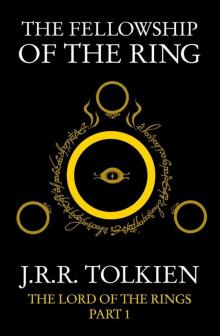 The Fellowship of the Ring
The Fellowship of the Ring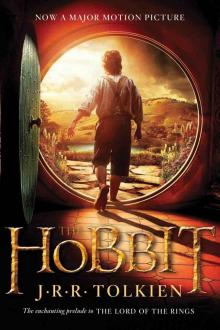 The Hobbit
The Hobbit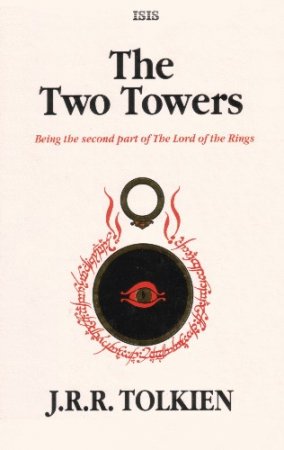 The Two Towers
The Two Towers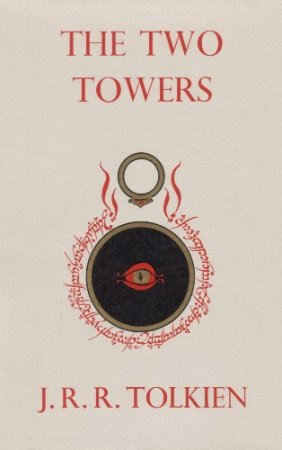 The Return of the King
The Return of the King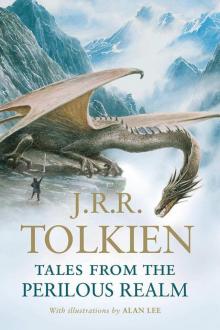 Tales From the Perilous Realm
Tales From the Perilous Realm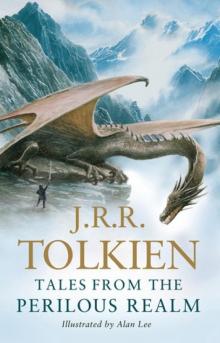 Leaf by Niggle
Leaf by Niggle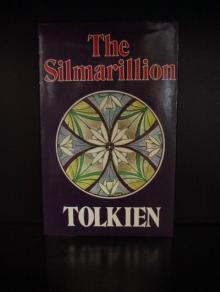 The Silmarillon
The Silmarillon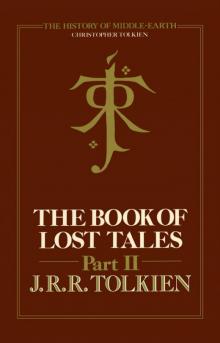 The Book of Lost Tales, Part Two
The Book of Lost Tales, Part Two The Book of Lost Tales, Part One
The Book of Lost Tales, Part One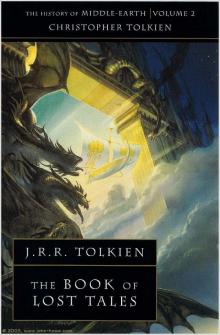 The Book of Lost Tales 2
The Book of Lost Tales 2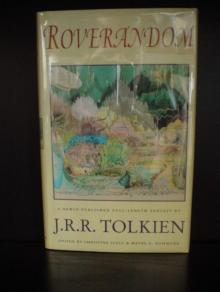 Roverandom
Roverandom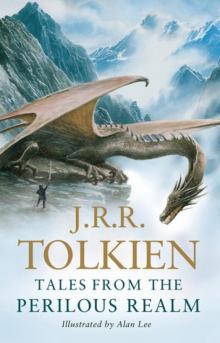 Smith of Wootton Major
Smith of Wootton Major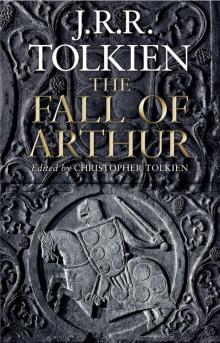 The Fall of Arthur
The Fall of Arthur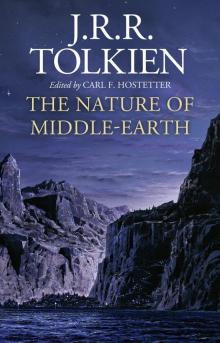 The Nature of Middle-earth
The Nature of Middle-earth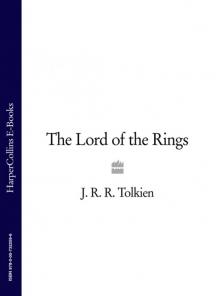 The Lord of the Rings: The Fellowship of the Ring, The Two Towers, The Return of the King
The Lord of the Rings: The Fellowship of the Ring, The Two Towers, The Return of the King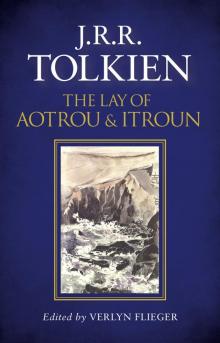 The Lay of Aotrou and Itroun
The Lay of Aotrou and Itroun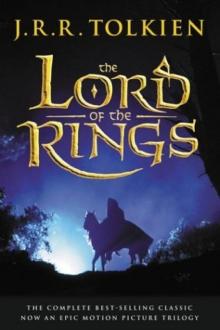 lord_rings.qxd
lord_rings.qxd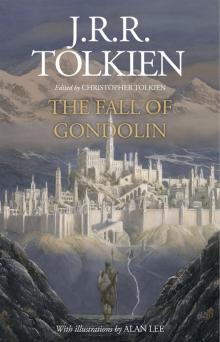 The Fall of Gondolin
The Fall of Gondolin The Book of Lost Tales, Part 1
The Book of Lost Tales, Part 1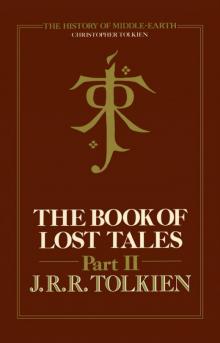 The Book of Lost Tales, Part 2
The Book of Lost Tales, Part 2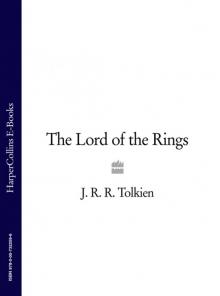 The Lord of the Rings
The Lord of the Rings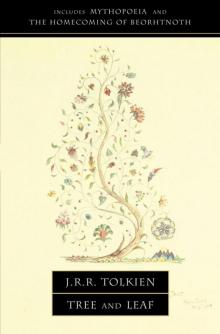 Tree and Leaf
Tree and Leaf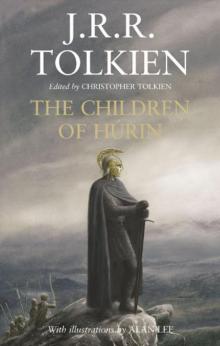 The Children of Húrin
The Children of Húrin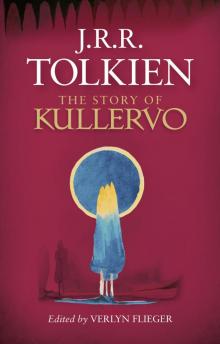 The Story of Kullervo
The Story of Kullervo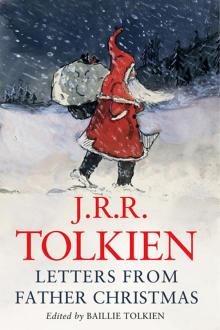 Letters From Father Christmas
Letters From Father Christmas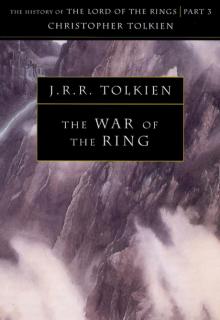 The History of Middle Earth: Volume 8 - The War of the Ring
The History of Middle Earth: Volume 8 - The War of the Ring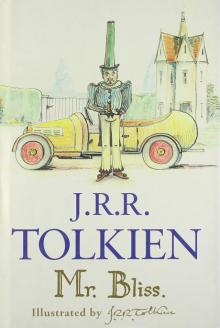 Mr. Bliss
Mr. Bliss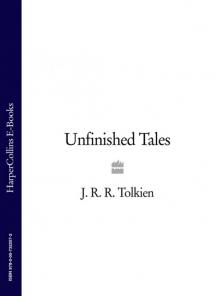 Unfinished Tales
Unfinished Tales The Adventures of Tom Bombadil
The Adventures of Tom Bombadil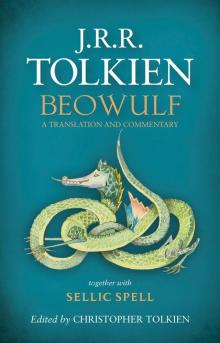 Beowulf: A Translation and Commentary, together with Sellic Spell
Beowulf: A Translation and Commentary, together with Sellic Spell The Silmarillion
The Silmarillion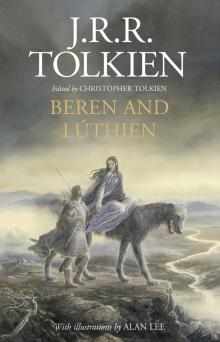 Beren and Lúthien
Beren and Lúthien